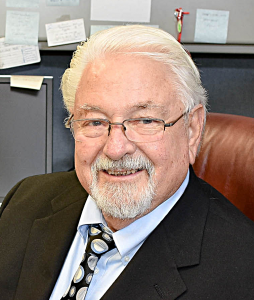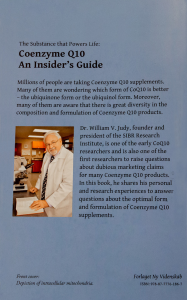Heart disease continues, worldwide, to be the leading cause of diminished health-related quality of life and the leading cause of death. Lifestyle choices are known to play an important role in the development of various heart and circulation ailments.

Working with Dr. Karl Folkers, Dr. William Judy, 1938-2022, was the research leader of clinical studies of the long-term management of heart failure with adjuvant Coenzyme Q10 therapy.
Individuals who want to avoid various forms of heart disease will need to pay attention to the following risk factors:
- Alcohol abuse
- Lack of exercise
- Obesity
- Poor nutrition and overeating
- Smoking
- Stress
Low Levels of Coenzyme Q10 and Selenium
Poor nutrition most likely includes inadequate intakes of essential micronutrients. In this review, we focus on two of the most important of them: Coenzyme Q10 and selenium.
As we age, our bodies produce less and less Coenzyme Q10. Typically, the heart muscle tissue of an 80-year-old man will contain less than half of the Coenzyme Q10 as there is in the heart muscle tissue of a 20-year-old man [Kalén 1989]. Moreover, certain medications, statin medications chief among them, will inhibit the body’s production of Coenzyme Q10 [Okuyama 2015]. Intakes of Coenzyme Q10 from food alone cannot make up for the loss. Supplementation is necessary [Judy 2018].
Similarly, in selenium-poor regions of the world such as much of Europe and the Middle East, there will be inadequate dietary intakes of selenium. The body cannot produce selenium. It must be gotten from food [Stoffaneller & Morse 2015]. Sub-optimal selenium status, i.e., serum levels below 100 mcg/L, are associated with more severe signs and symptoms of heart failure, poorer exercise capacity, and poorer quality of life [Bomer 2020].
Coenzyme Q10 and Selenium Interrelationship
Alehagen & Aaseth have explained that a deficient intake of selenium could impair the cells’ ability to obtain the optimal concentrations of Coenzyme Q10 and that the cells need adequate levels of Coenzyme Q10 to achieve an optimal function of selenium and selenoproteins. Thus, there should be a clinical benefit in supplementing both substances whenever there are deficient intakes within the population [Alehagen & Aaseth 2015].
Combined CoQ10 and Selenium Supplementation
In the KiSel-10 study of the effect of combined CoQ10 and selenium supplementation of elderly community living Swedish citizens with low serum concentrations of both substances, Alehagen et al observed the following beneficial outcomes. The study participants, average age 78 years, received 200 mg Coenzyme Q10 and 200 mcg selenium or matching placebos daily for 48 months [Alehagen 2022; Opstad 2022; Opstad 2023].
- Reduced cardiovascular mortality
- Improved heart function seen on echocardiograms
- Fewer days in the hospital
- Lower circulating levels of a biomarker for heart failure
- Lower circulating levels of biomarkers of oxidative stress
- Lower circulating levels of biomarkers of systemic inflammation
- Lower circulating levels of biomarkers of endothelial dysfunction
- Less shortening of leukocyte telomere length
- Increased circulating sirtuin SIRT1 levels
Coenzyme Q10 Supplementation of Chronic Heart Failure Patients

In his 2018 book, Dr. Judy summarized the clinical evidence for the use of adjuvant Coenzyme Q10 therapy with heart failure patients. The book contains several interesting case studies. It is available from amazon.com. The ISBN is 978-87-7776-186-7.
The KiSel-10 study showed the efficacy of combined CoQ10 and selenium supplementation in delaying the development and progression of heart disease [Alehagen 2018]. The Q-Symbio study showed the efficacy of CoQ10 supplementation as an adjuvant treatment of patients with chronic heart failure [Mortensen 2014].
The heart failure patients received 3 times 100 mg Coenzyme Q10 in divided doses, or matching placebos, together with meals, daily, in addition to their conventional heart failure medications. After two years of supplementation with the ubiquinone form of Coenzyme Q10, the same ubiquinone formulation used in the KiSel-10 study, the study outcomes showed [Mortensen 2014]:
- Reduced cardiovascular mortality
- Reduced all-cause mortality
- Reduced incidence of hospital stays
That is to say, the adjuvant administration of 3 x 100 mg of Coenzyme Q10 daily improved the heart failure patients’ prognosis and quality of life.
Conclusion
Clinical research has demonstrated the role of Coenzyme Q10 in the heart health in study participants without cardiovascular disease manifestations [Alehagen 2018; Alehagen 2022] and in patients with chronic heart failure [Mortensen 2014].
In a 2023 review of Coenzyme Q10 and heart disease clinical studies, the pharmacologists Fladerer and Grollitsch recommended Coenzyme Q10 in the form of ubiquinone instead ubiquinol for the prevention and treatment of heart disease [Fladerer & Grollitsch 2023].
Sources
Alehagen U, Aaseth J. Selenium and Coenzyme Q10 interrelationship in cardiovascular diseases–A clinician’s point of view. J Trace Elem Med Biol. 2015;31:157-62.
Alehagen U, Aaseth J, Alexander J, Johansson P. Still reduced cardiovascular mortality 12 years after supplementation with selenium and Coenzyme Q10 for four years: A validation of previous 10-year follow-up results of a prospective randomized double-blind placebo-controlled trial in elderly. PLoS One. 2018 Apr 11;13(4):e0193120.
Alehagen U, Johansson P, Svensson E, Aaseth J, Alexander J. Improved cardiovascular health by supplementation with selenium and Coenzyme Q10: applying structural equation modelling (SEM) to clinical outcomes and biomarkers to explore underlying mechanisms in a prospective randomized double-blind placebo-controlled intervention project in Sweden. Eur J Nutr. 2022 Sep;61(6):3135-3148.
Bomer N, Grote Beverborg N, Hoes MF, Streng KW, Vermeer M, Dokter MM, IJmker J, Anker SD, Cleland JGF, Hillege HL, Lang CC, Ng LL, Samani NJ, Tromp J, van Veldhuisen DJ, Touw DJ, Voors AA, van der Meer P. Selenium and outcome in heart failure. Eur J Heart Fail. 2020 Aug;22(8):1415-1423.
Fladerer JP, Grollitsch S. Comparison of Coenzyme Q10 (ubiquinone) and reduced Coenzyme q10 (ubiquinol) as supplement to prevent cardiovascular disease and reduce cardiovascular mortality. Curr Cardiol Rep. 2023 Dec;25(12):1759-1767.
Judy William V. The Substance That Powers Life: Coenzyme Q10, An Insider’s Guide. 2018. ISBN 978-87-7776-186-7. Available from amazon.com.
Kalén A, Appelkvist EL, Dallner G. Age-related changes in the lipid compositions of rat and human tissues. Lipids. 1989 Jul;24(7):579-84.
Mortensen SA, Rosenfeldt F, Kumar A, Dolliner P, Filipiak KJ, Pella D, Alehagen U, Steurer G, Littarru GP. The effect of Coenzyme Q10 on morbidity and mortality in chronic heart failure: results from Q-Symbio: a randomized double-blind trial. JACC Heart Fail. 2014 Dec;2(6):641-9.
Okuyama H, Langsjoen PH, Hamazaki T, Ogushi Y, Hama R, Kobayashi T, Uchino H. Statins stimulate atherosclerosis and heart failure: pharmacological mechanisms. Expert Rev Clin Pharmacol. 2015 Mar;8(2):189-99.
Opstad TB, Alexander J, Aaseth JO, Larsson A, Seljeflot I, Alehagen U. Selenium and Coenzyme Q10 intervention prevents telomere attrition, with association to reduced cardiovascular mortality-sub-study of a randomized clinical trial. Nutrients. 2022 Aug 15;14(16):3346.
Opstad TB, Alexander J, Aaseth J, Larsson A, Seljeflot I, Alehagen U. Increased SIRT1 concentration following four years of selenium and Q10 intervention associated with reduced cardiovascular mortality at 10-year follow-up-sub-study of a previous prospective double-blind placebo-controlled randomized clinical trial. Antioxidants (Basel). 2023 Mar 21;12(3):759.
Stoffaneller R, Morse NL. A review of dietary selenium intake and selenium status in Europe and the Middle East. Nutrients. 2015 Feb 27;7(3):1494-537.
The information summarized in this review article is not intended as medical advice. It should not be construed as such.








Leave A Comment